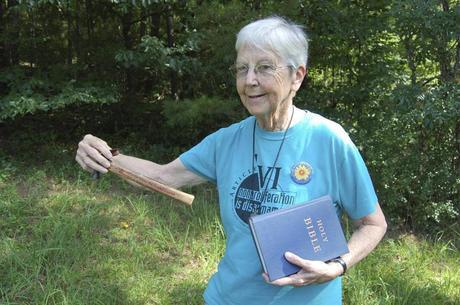
by Melodi Erdogan and Jennifer Brake / Reuters
A U.S. judge sentenced an 84-year-old nun, Sister Megan Rice, on Tuesday to 35 months in prison for breaking into a Tennessee military facility used to store enriched uranium for nuclear bombs.
Two others accused in the case, Michael Walli and Greg Boertje-Obed, were sentenced to 62 months in prison. The three were convicted of cutting fences and entering the Y-12 National Security Complex in Oak Ridge, Tennessee, in July 2012, embarrassing U.S. officials and prompting security changes.
“(Rice) does not have the extensive criminal records the others have. Her crimes are minimal in comparison to the others,” U.S. District Judge Amul Thapar said.
The three were also sentenced to three years of supervised release after leaving prison and ordered to pay restitution for the damage they caused.
Rice asked the judge not to take her age into consideration when handing out the sentence.
“To remain in prison for the rest of my life would be the greatest honor,” the nun said in court. “I hope that happens.”
Rice and the others admitted to spray painting peace slogans and hammering on exterior walls of the facility. When a guard confronted them, they offered him food and began singing.
The three were convicted by a federal jury last May of damaging national defense premises under the sabotage act, which carries a prison sentence of up to 20 years, and of causing more than $1,000 of damage to U.S. government property.
Prosecutors contended the break-in at the primary U.S. site for processing and storage of enriched uranium disrupted operations, endangered U.S. national security and caused physical damage.
Dozens of supporters held a prayer vigil for the group outside the courthouse.
Federal sentencing guidelines called for Rice to receive up to a little more than seven years in prison; Walli, 65, more than nine years; and Boertje-Obed, 58, more than eight years. The defendants have been in custody since their convictions.
Prosecutors wanted sentences in line with federal guidelines while defense attorneys called for lesser sentences, arguing the three were “completely nonviolent”.
Michele Naar-Obed, the wife of Boertje-Obed, said she considered the sentence a victory because the judge could have imposed a much longer prison term.
“The judge was really struggling with the difference between the letter of the law and the spirit of the law,” she said. (Reporting by Melodi Erdogan and Jennifer Brake in Knoxville, Tenn; Writing by Jon Herskovitz; Editing by Ken Wills)

